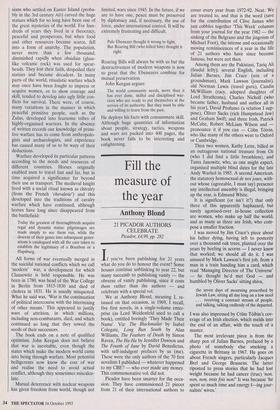Fill the measure of the year
Anthony Blond
21 PICADOR AUTHORS CELEBRATE Picador, £4.99, pp. 282 If you've been publishing for 21 years what do you do to honour the event? Some houses continue unblinking to year 22, but many succumb to publishing vanity — the obverse of vanity publishing, since it costs them rather than the authors — and celebrate with a special vol.
We at Anthony Blond, meaning I, re- issued on that occasion, in 1969, I recall, five first novels, in a single-volume enter- prise (as Lord Weidenfeld used to call a book), entitled boringly 'They Made Their Name'. Viz: The Blackmailer by Isabel Colegate, Long Run South by Alan Williams, The Feathers of Death by Simon Raven, The Ha-Ha by Jennifer Dawson and The Fourth of June by David Benedictus, with self-indulgent prefaces by us (me). These were the only authors of the 70 first novelists I published — whatever happened to my CBE? — who ever made any money. This commemorative vol. did not.
Picador have been smarter for the occa- sion. They have commissioned 21 pieces from 21 of their international authors to cover every year from 1972-92. Neat. We are treated to, and that is the word (save for the contribution of Clive James who just cobbles together 'This Week' columns from your journal for the year 1982 — the sinking of the Belgrano and the jingoism of Michael Foot), the intense and occasionally moving reminiscences of a year in the life of 21 authors who have since become famous, but were not then.
Among them are the Pakistani, Tariq Ali (feudal lefty); several English, including Julian Barnes, Jim Crace (son of a groundsman), Mark Lawson (journalist), old Norman Lewis (travel guru), Candia McWilliam (racy, adopted daughter of Lord Strathcona), Charles Nicholl (who became father, husband and author all in his year), David Profumo (a relation I sup- pose), Oliver Sacks (rich Hampstead Jew) and Graham Swift; and three Irish, Patrick McCabe, Robert McLiam Wilson and pronounce it if you can — COlm 'Colvin, who like many of the others went to Oxford or Cambridge.
Then two women, Kathy Lette, billed as an outrageous national treasure from Oz (who I did find a little breathless), and Tama Janowitz, who, as one might expect, organised multiple blind dates for the late Andy Warhol in 1985. A second American, the statutory homosexual de nos fours, with- out whose (agreeable, I must say) presence any intellectual assembly is illegal, bringing up the rear, is Edmund White.
It is significant (or isn't it?) that only three of this apparently haphazard, but surely agonised-over in-house collection are women, who make up half the world, and as many as three are Irish, who com- pose a smaller fraction.
I was moved by Jim Crace's piece about his father dying, having left to posterity over a thousand oak trees, planted over the years by heeling in acorns — I never knew that worked; we should all do it. I was amused by Mark Lawson's first job, from a man in a train handing him a card, which read 'Managing Director of The Universe' — he thought he'd met God — and humbled by Oliver Sacks' sitting shiva,
the seven days of mourning prescribed by Jewish Law, sitting all day long on a low stool . .. receiving a constant stream of people, and talking, talking endlessly of the departed.
I was also impressed by Colm Toibin's cov- erage of an Irish election, which melds into the end of an affair, with the touch of a master.
The most irrelevant piece is from the sharp pen of Julian Barnes, prefaced by a photo of somebody else smoking a cigarette in Brittany in 1967. He goes on about French singers, particularly Jacques Brel and George Brassens. The latter riposted to press stories that he had lost weight because he had cancer (true) 'non, non, non, trois fois non!' It was because 'he spent so much time and energy f—ing jour- nalists' wives.'


























































 Previous page
Previous page